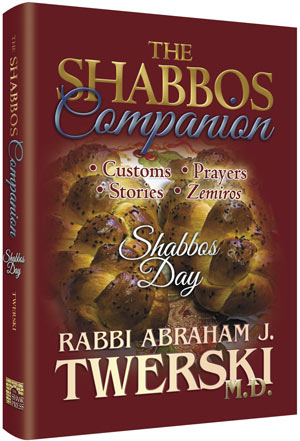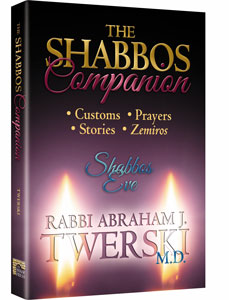

Reviewed by Ariella Marcus
Several years ago, I engaged in a lively exchange with a group of graduating high school girls about using a Shabbos meal as a tool of Jewish outreach. Speaking candidly in front of her teacher and peers, one girl admitted, “I’d be afraid to have guests at my table that might ask a question I can’t answer. I know what I believe and I know how to practice what I believe, but I’m not always sure why.”
If Rabbi Abraham Twerski’s The Shabbos Companion had been published at the time, I would have recommended she read it. While this two-volume set has nothing to do with kiruv/outreach, it nevertheless provides surprising answers to the why behind the what and how of Jewish practices vis-à-vis Shabbos. The intrinsically sublime nature of Shabbos is well-known; each Friday night when we sing Lecha Dodi, we reaffirm that Shabbos is makor habracha, the source of blessing. Understanding this uniquely sacred day gives us a framework to understand and cherish so many derivative facets of Jewish life.
It’s no surprise, though, that The Shabbos Companion is well-written. Rabbi Twerski’s writing career is legendary. Author of over fifty books, over thirty with ArtScroll, he is one of the most beloved writers in the Orthodox world today. A clinical psychiatrist and addictions specialist for over five decades, he long ago identified spiritual deficit disorder as the root cause of many of our modern societal ills. I once asked him in a radio interview how he’d written some seventeen books on the subject of self-esteem alone. With a smile in his voice, he said, “I didn’t write seventeen books on self-esteem; I wrote one book seventeen different ways!”
One of Rabbi Twerski’s distinguishing skills is his ability to fluidly shift gears from the academic dialect of psychology to the spiritual idiom of the soul. A descendant of a long and regal Chassidic dynasty, Rabbi Twerski is well-versed in the esoteric aspects of Judaism, as reflected in his book Lights Along the Way, a rich commentary on the Ramchal’s Mesillas Yesharim/Path of the Just.
In The Shabbos Companion Vol. I & II, Rabbi Twerski dives deep into the psyche of the weekly Shabbos celebration, revealing hidden treasures in the customs, prayers, and zemiros/songs so many take for granted. The Shabbos Companion is both a primer and a refresher course in the oneg/delight of Shabbos observance. Volume One is a treatment of the Sabbath Eve while Volume Two examines the components of the Sabbath Day.
Both volumes are a pleasure to read. They follow the linear sequence of events that characterizes Shabbos observance, from the Mincha prayer on Friday afternoon, through Kabbalas Shabbos with kiddush, the evening meal (with its songs and Bircas HaMazon), and on through Shabbos Day with Shacharis and Mussaf, Kiddush Rabbah, the day meal, Mincha, Seudas Shilshis, Maariv, Havdalah, and Motzei Shabbos.
As Rabbi Twerski describes the traditions, laws, prayers, and songs of Shabbos, he intersperses fascinating Shabbos stories from yesteryear. At times I got lost in some of these moving tales about far-away Jews who labored so hard to preserve the Day of Rest. While anyone can find substance just by randomly opening to a page in either volume, this set is an excellent resource to systematically share with family and guests at one’s Shabbos table. For example, rather than perfunctorily launching into one of the familiar Shabbos zemiros/songs between meal courses, the baal haseudah/host can bestow an expanded appreciation for the song by reading Rabbi Twerski’s rich explanation of it. Employed this way, The Shabbos Companion offers nearly two years worth of insight to enhance the conversation during the Shabbos meals.
Now the caveat: A reviewer is compelled to express something negative about a book so as to proffer a slight chill of objectivity. Having already read (correction: browsed) many popular books on Shabbos, I was delighted that Rabbi Twerski’s approach to this highly published subject was unique – so distinct, in fact, that the only thing negative I can say here is that I wanted more.
In introducing Vol. One Shabbos Eve, Rabbi Twerski relates a story of a chassidic rebbe who was enchanted by the holiday of Succos. “He said that whereas other mitzvos are fulfilled with only the body, Succos encompasses the entire body. ‘You enter into this mitzvah [the succah] with your boots.’ The led another rebbe to comment, ‘Yes, but you must take the action to go into the succah. Shabbos is even greater, because you don’t have to do anything. The kedushah [holiness] of Shabbos comes down upon you wherever you may be.’”
The Shabbos Companion reflects that encompassing embrace of Shabbos. Wherever a person may be in his/her Torah literacy and observance, these two well-crafted books will meet a person where s/he is, offering illumination of the mind and elevation of the spirit.
ArtScroll Shaar Press, $21.99/each, Hardcover
See Table of Contents and sample pages of Volume One here.
See Table of Contents and samples pages of Volume Two here.
See a complete listing of Rabbi Twerski's published works from ArtScroll here.





No comments:
Post a Comment